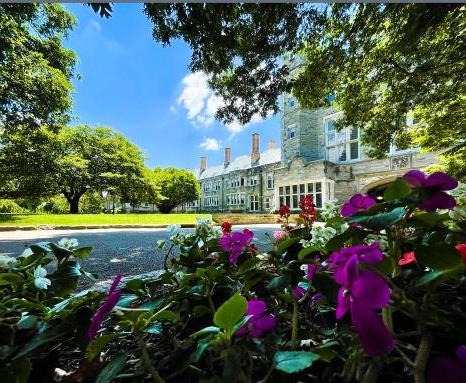Land Acknowledgement
The land on which Bryn Mawr College stands is part of the ancestral homeland and territory of the Lenape people. As a College we offer the following land acknowledgements on behalf of the College and for use by the community. The texts of these acknowledgements were approved by the Lenape Nation of Pennsylvania and may be modified as the College engages with multiple Lenape tribes. The College offers two versions, for use in different contexts:
- Version 1: We recognize that we stand on Lenape Land, and pay respect and honor to the caretakers of this land, from time immemorial until now, and into the future.
- Version 2: We openly recognize the Lenape Indian tribe as the original inhabitants of eastern Pennsylvania. We acknowledge the Lenape people as the indigenous stewards of their homelands and also the spiritual keepers of the Lenape Sippu, or Delaware River, and we do hereby commit to actively supporting our Lenape [siblings] in whatever way we are able, helping to maintain the cultural identity of Pennsylvania, Delaware, New Jersey and southern New York.
With these land acknowledgements, Bryn Mawr College recognizes the continuing presence of Lenape people in their homeland and throughout the Lenape diaspora and pays respect to Lenape people past, present, and future. As part of these land acknowledgements, we reflect on the histories of exclusion and erasure that have affected Lenape and other Indigenous nations across North America since European colonization. Going forward, the College is guided by principles of inclusion, visibility, and integrity as we seek to understand Bryn Mawr’s historical and present relationship to Lenape people, histories, and land. We recognize that we are not the original inhabitants of this land and must be mindful of our place in history as current stewards in relation to all who have gone before us and who will follow.
In offering this land acknowledgement, we understand the danger that such statements become merely a performative gesture. As we go forward in using this acknowledgement, we hope it will help all of us to engage in the practice to be always mindful, no matter where we are, of whose land we occupy and of the legacies of settler colonialism. This is one way to honor the Lenape peoples’ historical and present relationship to this land. This land acknowledgement can also serve to remind us that we have a responsibility to this land the College occupies and that we should be good stewards of its health and sustainability.
We encourage members of the community to use these land acknowledgements in ways that are meaningful and that support mindful engagement with their significance. This might include discussion in a class, further research to learn more about Lenape histories and culture and about European settler histories in this region, projects focused on stewardship of the land, or connecting with broader community actions in partnership with Lenape and other Indigenous groups. We also encourage individuals to practice active listening when engaging in these activities and seek to gain understanding, increase knowledge, and help build a culture of humility and continuous learning.
The College is also combining this land acknowledgement with other informed actions and relationship-building. All formal College events such as Convocation and Graduation now begin with a spoken land acknowledgement. Our work with the North American Graves Protection and Repatriation Act (NAGPRA) project is in progress and the College is in dialogue with appropriate Indigenous Tribes. Settler colonialism and Indigenous peoples’ histories are areas of focus throughout several classes at Bryn Mawr.
Our community also looks forward to the outcomes of important new developments such as the founding of a new student group for Indigenous peoples in fall 2022 and the thematizing and remediation of exclusion and erasure in the College’s history as elements within the ARCH project and our partnership with Monument Lab.

Connect
Related Contacts
The Impact Center for Community, Equity, and Understanding
610-526-6592
Campus Partnership for Equity and Anti-Racism
Co-Conveners: Dee Matthews (Creative Writing) and Ann-Therese Ortíz (The Impact Center)
cpear@dos5.net